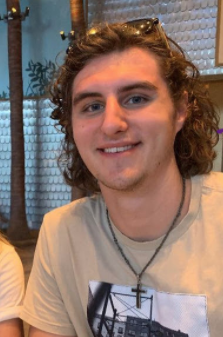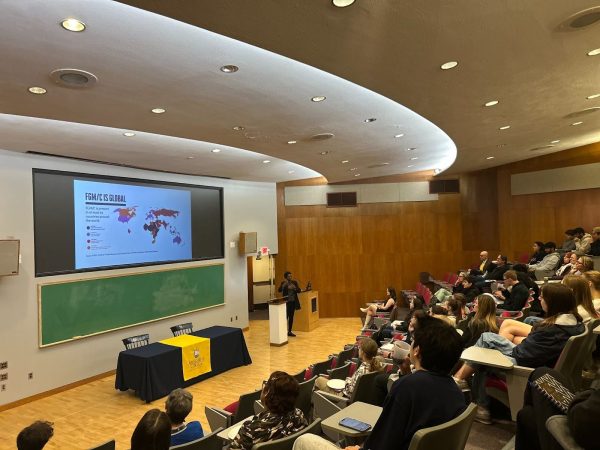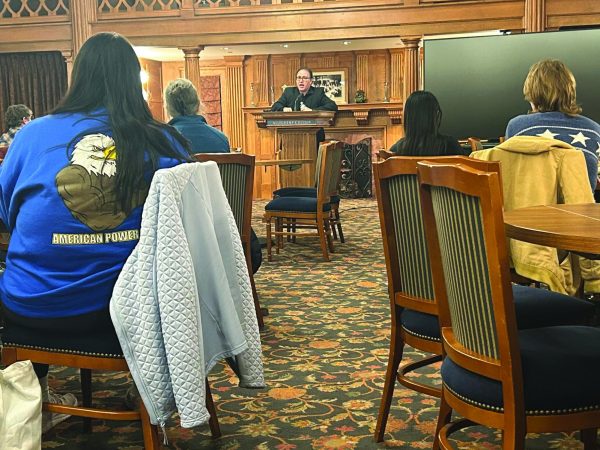‘Chomping’ the comp
Seniors celebrate capstone projects
As the end of the 2021-22 academic year approaches, most Allegheny students are thinking about what classes they need to register for next semester. For seniors, though, their comprehensive projects fill the time they would have spent searching for classes and then some.
This capstone project is a staple to an Allegheny education and requires students to put their academic prowess to use as they work towards a published research paper.
Final projects vary by department and some students must combine elements from multiple fields if they are a double major. This allows for students to be creative and think critically about how different fields inform each other in ways we may not often recognize.
“I’m a double major in Economics and Environmental Science and Sustainability, so for my comp I looked to see how knowledge affects the purchasing habits of anglers regarding biodegradable lures,” Connor Mastalerz, ’22, said.
Research is not confined to Google searches for many students. Surveys, lab tests and field work are often means of conducting research as well, allowing students to gain experience working with their topic.
“I used a survey to obtain my data and so one of the biggest challenges was wording my survey questions correctly to make sure participants understood what I was asking them,” Mastalerz said. “I also had some setbacks with the (Institutional Review Board) approval process which delayed my data collection period and limited my responses.”
Students conducting human research must first complete the appropriate Collaborative Institutional Training Initiative courses before submitting a proposal plan to the Allegheny IRB. Over the course of these semester- or year-long projects, challenges are inevitable and arise in many ways.
“Articulating what I did in lab over a whole school year and putting it into words was tough,” Maddy Hill, ’22, said. “Your comp has to be explained in a way that people can understand and it’s hard to put all your work in a complete story line sometimes.”
Though students spend day after day on their work, not all of their time spent is able to yield results.
“Sometimes all the lab work you do equals one or two sentences in writing and other times your work means nothing at all and that can be frustrating,” Hill said.
Though the day-to-day grind may not always be fruitful, by the end of the process students often find themselves faced with more information than their final projects can hold.
“The biggest challenge I faced was taking the information from my research and process sections, and then analyzing all at once,” Tully Taylor, ’22, said. “There was so much good information and so many interesting things that happened that I just couldn’t fit it all in my final comp and I wish I could have included it all.”
As a theatre major, Taylor’s project was centered around The Playshop Theatre’s “She Kills Monsters” performance which took place April 28 through May 1. Taylor stage managed the show and documented the work she did along the way for her project that focused on fostering inclusive spaces in the theatre.
“I implemented different aspects that positively impacted the inclusivity of the space such as integrating music, having open office hours that my peers in the show could attend and establishing a system of open communication with everyone,” Taylor said. “I also tried to focus on how to create those inclusive spaces while we had actors participating in stage intimacy and stage combat — two things that require the actors to be vulnerable. It was important to me that we kept this a safe space and allowed questions, concerns and feelings come through no matter what.”
Through these projects, students are able to get a glimpse into what their peers in different majors are doing. While the work may seem routine to those who have spent four years in the field, the resulting projects offer many nuances to those less familiar with the subject.
“I don’t necessarily think that my comp is unique from others who complete theirs in theatre, but it may be perceived as different from another majors’ point of view,” Taylor said. “It’s unique because I stage managed a show, but at the same time it’s similar to other comps because that could be considered the active research or survey portion that other people gathered.”
Through all the ups and downs that these intensive projects can present, many students walk away with a sense of accomplishment when they finally get to hold their completed work in hand.
“The most rewarding part of the process was getting to see my finished comp typed up and printed out after a year of working on it,” Hill said.
Many students work on topics that are meaningful to them and this allows their work, the contents of their projects and the feedback they receive all a reward within itself. But as senioritis kicks in and graduation day approaches, everyone knows there is nothing more satisfying than being done.
“There were two really rewarding aspects of my project,” Taylor said. “The first is that I helped foster a space where everyone felt welcome and safe. The second is that I finally submitted it!”

Jordan Greynolds, '22, is a features editor for The Campus newspaper and it is his second semester on staff. He is a business and religious studies double...







